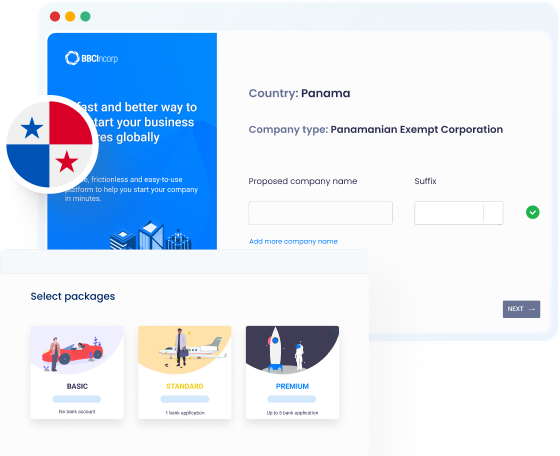Navigating the World of International Service: Insights on Offshore Company Formation
Offshore Company Formation provides a calculated method for global business procedures. It supplies significant benefits, such as tax obligation optimization and improved privacy. However, the process is not without its challenges. Understanding the intricacies of numerous jurisdictions and regulative demands is important. As services think about these choices, the actions included can greatly affect their lasting success. What are the crucial elements that can lead to reliable offshore monitoring?
Comprehending Offshore Firms: Interpretation and Objective
Offshore firms have actually become a prime focus in worldwide service discussions because of their special legal and economic structures. These entities are developed in territories beyond the proprietor's country of residence, typically with positive regulative atmospheres. Typically, offshore companies offer numerous objectives, such as property security, tax optimization, and improved personal privacy. They can run in numerous industries consisting of trade, innovation, and money, providing adaptability for global operations.The defining feature of an offshore Company is its capability to carry out organization worldwide while profiting from decreased tax obligation responsibilities and regulatory problems. This structure allures to capitalists and business owners seeking to diversify their portfolios and handle threats successfully. Furthermore, numerous offshore jurisdictions offer incentives to attract international investment, bring about a rise in the Formation of these firms. Understanding the definition and objective of overseas business is crucial for maneuvering through the intricacies of international commerce and capital flow.
Trick Benefits of Offshore Company Formation
The Formation of an overseas Company supplies numerous engaging benefits that attract investors and entrepreneurs alike. One of the primary benefits is tax optimization; many territories provide favorable tax rates or exceptions, permitting services to optimize earnings. In addition, offshore companies frequently take pleasure in higher confidentiality, as several jurisdictions have strict privacy legislations safeguarding the identifications of Company owners and shareholders.Another substantial advantage is property security. Offshore entities can secure properties from political instability and financial recessions in the owner's home country. These business can help with global profession, providing simple accessibility to worldwide markets and simplifying cross-border transactions.The versatility in corporate framework likewise charms to organization proprietors, as overseas companies can be tailored to meet details operational needs. In general, the calculated Formation of an offshore Company can result in enhanced monetary security, operational effectiveness, and a durable worldwide presence.

Common Difficulties in Developing Offshore Entities
Establishing offshore entities provides a number of obstacles that businesses must navigate. Secret issues consist of governing compliance, which can differ considerably across territories, and the influence of social differences on procedures. In addition, organizations need to consider the dangers and costs related to maintaining an overseas visibility, which can influence overall viability.
Governing Compliance Issues
Steering regulatory conformity issues presents considerable challenges for organizations when they seek to develop offshore entities. Each territory has its own collection of guidelines and legislations, which can vary widely and might be challenging to browse. Business frequently deal with obstacles related to tax compliance, anti-money laundering guidelines, and coverage demands. In addition, adjustments in global tax obligation regulations can produce uncertainty, making it crucial for companies to stay updated on conformity commitments. Failing to comply with these regulations can result in severe charges, consisting of fines and reputational damages. Recognizing the legal structure and involving with neighborhood specialists is crucial for effective offshore operations, making sure that services can run within the confines of the regulation while maximizing their global strategy.
Cultural Differences Influence

Cost Factors To Consider and Dangers
Steering through the monetary landscape of overseas entity Formation offers numerous expense considerations and fundamental dangers. First arrangement costs commonly consist of legal fees, registration expenditures, and conformity fees, which can gather substantially. In addition, continuous maintenance expenses such as yearly costs and accountancy solutions must be factored in. Furthermore, changing regulative environments in various territories present dangers, potentially causing lawful problems or unforeseen costs. Businesses may also encounter obstacles associated to tax, banking, and reputational concerns, which can influence success and operational efficiency. Prospective business owners should perform detailed due diligence and economic forecasting to alleviate these risks and assure lasting development. Understanding these expense factors to consider is crucial for effective overseas company endeavors.
Actions to Set Up an Offshore Company
Establishing an offshore Company includes several crucial actions that call for cautious factor to consider. Trick factors include making sure and selecting the proper territory compliance with local guidelines, along with gathering needed documents. Understanding these aspects is crucial for a successful offshore company configuration.
Picking the Right Territory
Selecting the best territory is essential for anybody wanting to establish an offshore Company, as it can considerably impact business's lawful commitments, tax obligation obligations, and operational ease. Different aspects ought to be considered, consisting of the political stability, regulative environment, and tax obligation rewards offered by potential territories. Popular choices commonly consist of countries with positive tax programs, such as the British Virgin Islands or Cayman Islands, due to their reduced or absolutely no tax rates. In addition, the ease of doing service and the credibility of the jurisdiction can affect investor confidence and market gain access to. Ultimately, an educated decision based on detailed research study will certainly ensure the overseas Company is placed for long-lasting success and conformity with international requirements.
Required Documents and Compliance
When establishing an overseas Company, understanding the needed documentation and conformity demands is vital to guarantee a smooth process. Trick records usually consist of a certificate of unification, a memorandum and short articles of organization, and evidence of identification for directors and shareholders. Some territories might require additional information, such as organization plans or bank referrals. Compliance with regional legislations is essential, which often includes selecting a signed up representative and keeping a registered office. Regular reporting and adherence to tax responsibilities have to likewise be thought about. Failure to abide with these needs can result in charges or also dissolution of the Company. Comprehensive prep work and consultation with legal experts can help browse these intricacies effectively.
Choosing the Right Territory for Your Offshore Company
Just how can one determine one of the most ideal jurisdiction for an offshore Company? Choosing the best jurisdiction calls for careful factor to consider of numerous aspects. The legal and tax atmosphere plays a vital function; territories with positive tax regimes may enhance business productivity. Furthermore, the political stability and financial environment of a place can influence long-lasting business viability.Another essential aspect is the schedule of monetary solutions and financial facilities, which help with smooth procedures. Potential organization owners ought to also consider the simplicity of operating, including the rate of registration and the quality of regulations.Furthermore, language barriers and social distinctions can influence operations; as a result, aligning with a territory that lines up with organization goals and personal comfort is important. Inevitably, extensive study and expert advice can lead entrepreneurs in making an educated decision that straightens with their tactical goals.
Compliance and Regulative Considerations

Best Practices for Handling an Offshore Business
Handling an overseas company requires calculated planning and meticulous implementation to maximize efficiency and reduce threats. Initially, establishing a durable compliance structure is necessary to browse varying guidelines across territories. Normal audits and threat assessments aid recognize potential vulnerabilities.Moreover, leveraging regional knowledge via collaborations with neighborhood professionals can enhance operational performance and social understanding. Using modern technology, such as cloud-based monitoring systems, enhances communication and data management, making it possible for better decision-making. In addition, keeping transparent economic records and making sure prompt tax obligation filings are vital to support the Company's stability. Investing in personnel training and advancement cultivates a knowledgeable workforce, promoting development and adaptability.Finally, establishing clear performance metrics and crucial efficiency indicators (KPIs) assists analyze service progress and educate calculated adjustments. By adhering to these best techniques, business can successfully handle their overseas operations, making sure lasting success and sustainability in a competitive worldwide marketplace.
Often Asked Concerns
What Is the Expense of Forming an Offshore Company?
The cost of developing an offshore Company varies extensively relying on jurisdiction, lawful requirements, and services needed. Commonly, costs can range from a few hundred to several thousand dollars, including registration, compliance, and annual fees.
How much time Does It Take to Establish an Offshore Entity?
The moment required to develop an offshore entity varies substantially, normally varying from a few days to several weeks (offshore company formation). Variables influencing this period consist of jurisdiction, called for documentation, and the effectiveness of the provider entailed
Can Individuals Kind Offshore Companies Without a Company Partner?
Individuals can indeed form overseas firms without a company companion. Many territories enable single-member entities, encouraging entrepreneurs to develop and handle their companies independently, while still taking advantage of prospective tax obligation benefits and legal securities.
Exist Any Type Of Tax Obligation Advantages for Foreign Investors?

What Sort Of Services Typically Utilize Offshore Business?
Offshore business are regularly utilized by numerous fields, including money, modern technology, and ecommerce. These entities commonly serve purposes such as possession defense, tax optimization, and personal privacy, interesting both individual entrepreneurs and multinational companies. Offshore companies have become a focal point in worldwide service conversations due to their one-of-a-kind lawful and monetary structures. They can operate in numerous industries consisting of money, modern technology, and trade, supplying versatility for international operations.The specifying characteristic of an offshore Company is its capacity to perform service internationally while profiting from reduced tax liabilities and regulative burdens. Additionally, overseas business usually take pleasure in better privacy, as numerous territories have rigorous privacy laws safeguarding the identities of Company owners and shareholders.Another significant benefit is asset defense. These business can promote worldwide trade, providing very easy access to international markets and streamlining cross-border transactions.The versatility in business structure also charms to company proprietors, as offshore firms can be tailored to meet particular operational needs. Picking the ideal jurisdiction is essential for anyone looking to set up an overseas Company, as it can substantially impact the organization's legal commitments, tax responsibilities, and operational simplicity.